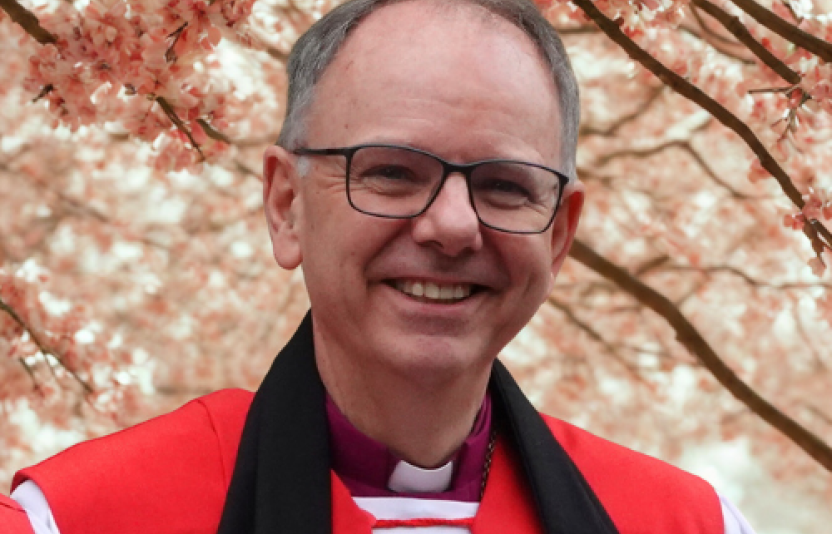Anglicans in the European Institutions
We have a page on the Diocesan website dedicated to our work as ANGLES - Anglicans in the European Institutions - representing the Church of England and the wider Anglican Communion in the EU in Brussels, and the Council of Europe in Strasbourg.
You can read more below about our priorities representing Anglican perspectives in European Institutions and ecumenical organisations.
Archbishop of Canterbury’s Representation to the European Institutions
We represent the Church of England and the wider Anglican Communion in the European Union Institutions in Brussels, and the Council of Europe in Strasbourg. You can find links to EU Institutions and the Council of Europe here:
https://www.consilium.europa.eu/
https://ec.europa.eu/info/index_en
https://www.europarl.europa.eu/portal/en
https://www.coe.int/en/web/portal
Archbishop of Canterbury's Representative to the European Institutions
The Rt Revd Dr Robert Innes
In addition to his role as Diocesan Bishop, Bishop Robert is the Archbishop of Canterbury’s Representative to the European Institutions. He advises the Archbishop and senior Church leadership on the work of the EU, notably in the Article 17 High Level Dialogue of religious leaders, on the Council of Europe and ecumenical relations in the pan- European context.
https://ec.europa.eu/commission/news/high-level-meeting-religious-leaders-2018-oct-08_en
Bishop's Attaché to the European Institutions
The Rt Revd Dr David Hamid, The Suffragan Bishop in Europe engages actively on ecumenical relations, and is co-Chairman of the International Anglican-Roman Catholic Dialogue (IARCCUM)
The Revd Canon Malcolm Rogers is the Archbishop of Canterbury’s Apokrosarios (high level representative) to the Patriarchate of the Russian Orthodox Church. He is Chaplain, St Andrew's Anglican Church, Moscow in the Diocese.
The Revd Canon Leonard Doolan is the Archbishop of Canterbury’s Apokrosarios (high level representative) to the Greek Orthodox Church. He is Chaplain, St Paul's Anglican Church, Athens in the Diocese.
Conference of European Churches (CEC)
Bishop Guli Francis-Dehqani is the Anglican Vice-President of the Conference of European Churches. She is Bishop of Loughborough and Suffragan Bishop in the Diocese of Leicester. In addition to her role on the CEC Governing Board, to which she was elected in 2018, Bishop Guli has a particular interest in refugee and migration issues.
UK Parliament
In the House of Lords, Bishop Nick Baines is Lead Bishop for Europe.
Lords Spiritual contribute regularly to debates and matters of European policy, holding the UK Government to account.
Our advocacy and engagement:
You can find below links and references to our coverage on advocacy work, including in Church and wider media. Please note footage or recordings may no longer be available on TV and radio sources.
https://europe.anglican.org/main/latest-news/post/1588-hagia-sophia
https://europe.anglican.org/main/latest-news/post/1518-bishop-robert-brexit-latest
https://europe.anglican.org/main/latest-news/post/1506-brexit-bishops-issue-letter-on-no-deal
https://europe.anglican.org/main/latest-news/post/1484-european-parliament-elections-2019
https://europe.anglican.org/main/latest-news/post/1482-europe-day-2019
https://europe.anglican.org/main/latest-news/post/1465--bishop-robert-brexit-latest
https://europe.anglican.org/main/latest-news/post/1463-brexit-diocese-gets-support-at-westminster
Our current key priorities are aimed at achieving key strategic objectives working with Governments, the European Institutions and through our ecumenical relationships:
Brexit: Citizens’ Rights
The Diocese in Europe Residency Support Project is part of the UK Nationals Support Fund Programme designed to help an estimated 1.3M UK nationals to apply for residency in EU member States following the UK's exit from the EU in January 2020. The Diocese in Europe has bid successfully for a £250,000 grant by the UK Government to lead a Project in France, the largest funding award the Diocese has ever received; and is supporting another project in Spain. This effort is aimed at concrete social action in direct response to the concerns raised with us most frequently since the Brexit referendum in June 2016.
You can find out more and about how to access the services provided on the Residency Support project website at:
http://www.frenchresidencysupport.org/
EU Refugee & Migration policy
- The publication of the EU migration pact on 23 September 2020 provides the focus for our strategy, policy and advocacy work.
- We will be working closely with Lambeth Palace, the Archbishop’s Representative to the UN, ecumenical partners in the World Council of Churches and the Catholic Church in the European Union (COMECE), as well as faith based organisations and projects on the ground, including the Calais Refugee Project, co-sponsored by the Diocese in Europe, Diocese of Canterbury and USPG.
https://www.archbishopofcanterbury.org/lambeth-palace/archbishops-staff-team
https://www.canterburydiocese.org/
The Future of the EU: Covid-19 recovery and beyond
In July 2020, EU leaders agreed a €1.8 trillion Covid-19 recovery package coupled with EU budget plans to 2027. We will provide information on the implementation of this package and its priority areas for social and economic reconstruction for allocation across EU Member States.
https://europa.eu/european-union/coronavirus-response_en#eu-actions
- The other important dimension to this work stream is the Future of Europe Conference on the shape of the EU and its policies, a two-year engagement, launched in May 2020.
https://ec.europa.eu/commission/presscorner/detail/en/ip_20_89
Council of Europe: Istanbul Convention on Preventing and Combating Violence Against Women and Domestic Violence
Combating gender-based violence against women and girls is a key priority of the Anglican Communion. The 47 Member Council of Europe agreed the Istanbul Convention in 2012. Among the 47 members of the Council of Europe which have not yet ratified the Convention is the UK.
This advocacy work emphasises the importance of the Istanbul Convention in relation to the UK Government, and will engage with the UK members of the Council of Europe Assembly as well as campaign organisations. It will support the advocacy of Bishops in the House of Lords as the UK Government seeks to pass domestic legislation on domestic abuse.
https://www.coe.int/en/web/istanbul-convention/home
We will also continue to work on Freedom of Religion and Belief. This has been a key area of past Anglican contribution shaping the work of the EU. We will focus effort on working on EU human rights dialogues with third states of concern, identified in the Bishop of Truro's Independent Review of Foreign & Commonwealth Office Support for Persecuted Christians.
https://christianpersecutionreview.org.uk/
Follow Us:
We will provide updates on our work in stories and blogs on our website, which will be included in this area, and featured in our e-News online bulletins and European Anglicans magazine as well as on Diocesan social media (Facebook, Twitter, Instagram)
We will also continue to contribute to Church and wider European press, radio and TV media.


